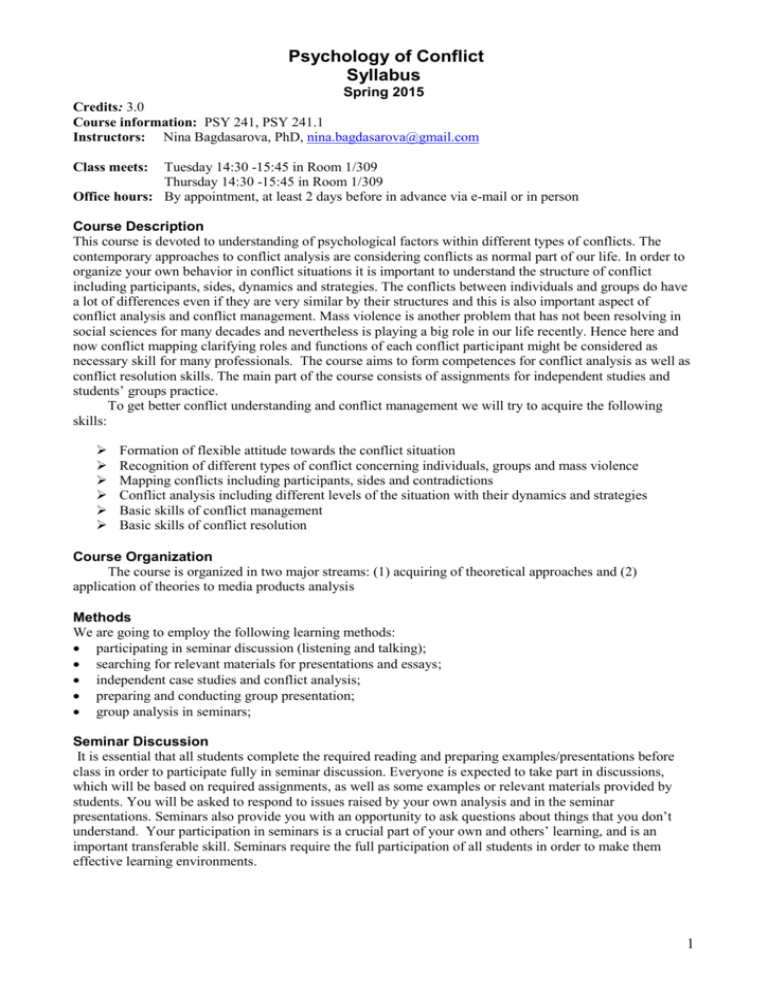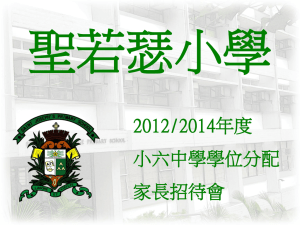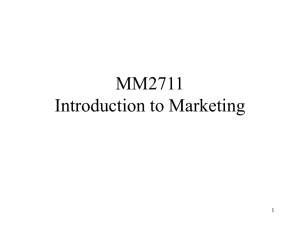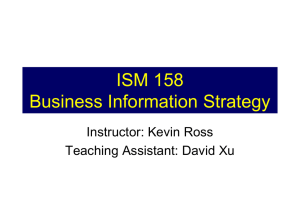Groups` presentations on chosen materials analysis (handouts on e
advertisement

Psychology of Conflict Syllabus Spring 2015 Credits: 3.0 Course information: PSY 241, PSY 241.1 Instructors: Nina Bagdasarova, PhD, nina.bagdasarova@gmail.com Class meets: Tuesday 14:30 -15:45 in Room 1/309 Thursday 14:30 -15:45 in Room 1/309 Office hours: By appointment, at least 2 days before in advance via e-mail or in person Course Description This course is devoted to understanding of psychological factors within different types of conflicts. The contemporary approaches to conflict analysis are considering conflicts as normal part of our life. In order to organize your own behavior in conflict situations it is important to understand the structure of conflict including participants, sides, dynamics and strategies. The conflicts between individuals and groups do have a lot of differences even if they are very similar by their structures and this is also important aspect of conflict analysis and conflict management. Mass violence is another problem that has not been resolving in social sciences for many decades and nevertheless is playing a big role in our life recently. Hence here and now conflict mapping clarifying roles and functions of each conflict participant might be considered as necessary skill for many professionals. The course aims to form competences for conflict analysis as well as conflict resolution skills. The main part of the course consists of assignments for independent studies and students’ groups practice. To get better conflict understanding and conflict management we will try to acquire the following skills: Formation of flexible attitude towards the conflict situation Recognition of different types of conflict concerning individuals, groups and mass violence Mapping conflicts including participants, sides and contradictions Conflict analysis including different levels of the situation with their dynamics and strategies Basic skills of conflict management Basic skills of conflict resolution Course Organization The course is organized in two major streams: (1) acquiring of theoretical approaches and (2) application of theories to media products analysis Methods We are going to employ the following learning methods: participating in seminar discussion (listening and talking); searching for relevant materials for presentations and essays; independent case studies and conflict analysis; preparing and conducting group presentation; group analysis in seminars; Seminar Discussion It is essential that all students complete the required reading and preparing examples/presentations before class in order to participate fully in seminar discussion. Everyone is expected to take part in discussions, which will be based on required assignments, as well as some examples or relevant materials provided by students. You will be asked to respond to issues raised by your own analysis and in the seminar presentations. Seminars also provide you with an opportunity to ask questions about things that you don’t understand. Your participation in seminars is a crucial part of your own and others’ learning, and is an important transferable skill. Seminars require the full participation of all students in order to make them effective learning environments. 1 Study Groups It’s necessary to form students’ groups for preparing groups presentations. The different groups can be formed for different assignments according your own preferences. The optimal group size is no more than 3 members. The work in pairs is welcomed. Literature Topics and schedule Topics Week 1 Tue, 20/01 Introduction to the course. Principals and levels of conflict analysis. INTRODUCTIONS. Psychology of conflict: what it might be about? The main approaches towards conflict analysis. Thu, 22/01 “WHY DO I CARE SO MUCH?” Intra/Inter personal conflict. The role of emptions within the conflict. Week 2 Tue, 27/01 Principals and levels of conflict analysis. “Emotional wheel”. Identifying “Bugs”: Class practice on “conflict experience analysis” and emotional management Thu, 29/01 Conflict analysis and “basic needs” concept. Week 3 Conflict analysis: the structure Tue, 03/02 The general schema of conflict analysis: participants, sides, contradictions (the “onion of the conflict”) Thu, 05/02 Practice on analytical instruments: the (“onion of the conflict”) Week 4 Conflict analysis: the structure Tue, 10/02 Practice on analytical instruments: the “onion of the conflict” Thu, 12/02 Analysis on conflict cause: “the conflict volcano” Week 5 Conflict analysis: the structure Tue, 17/02 Practice on analytical instruments: “the conflict volcano” Thu, 19/02 Practice on analytical instruments: “the conflict volcano” Week 6 Conflict analysis: the structure. Conflict analysis: the dynamics. Tue, 24/02 Practice on analytical instruments: “the conflict volcano” Thu, 26/02 Stages of conflict: what and when might be done. Stages matrix. Required readings, homework and assignments Individual inquiries: what mechanisms of psychological defense I am usually using? Individual inquiries: what kind of “cooling strategies” I can invent for myself? Individual inquiries: what kind of problem with basic needs do I have? Group presentations on chosen materials (handouts on e-course) Group presentations on chosen materials Group presentations on chosen materials (handouts on e-course) Groups’ presentations on chosen materials analysis 2 Week 7 Conflict analysis: the structure. Conflict analysis: the dynamics. Tue, 03/03 Practice on analytical instruments: stages matrix. Thu, 05/03 Week 8 Week 9 Groups’ presentations on chosen materials analysis (handouts on e-course) MIDTERM SPRING BREAK. NO CLASSES (MON, 9/03 FRI,13/03) Mass violence and conflict analysis “Scapegoat”, Chapters 2-3 Tue, 17/03 “Scapegoat” of Rene Girard: how does “the crisis” look like and why mass violence becomes possible. Thu, 19/03 The ABC model of conflict analysis Week 10 Mass violence and conflict analysis Tue, 24/03 Thu, 26/03 Week 11 Tue, 31/03 Thu, 02/04 Week 12 Tue, 07/04 Chapter 2 Practice on analytical instruments: ABC model of conflict Groups presentations: analysis comparative analysis on chosen materials Practice on analytical instruments: ABC model of conflict analysis Conflict resolution strategies Groups presentations: Practice on analytical instruments: ABC model of conflict comparative analysis on analysis chosen materials The strategies of conflict behavior. Thomas model. Conflict resolution strategies Practice on conflict behavior analysis. Thu, 09/04 What can we do with the conflict? Negotiation. Week 13 Tue, 14/04 Conflict resolution strategies Practice on negotiation. Role game. Individual inquiries: what kind of conflict behavior I am usually choosing and why? Thu, 16/04 Week 14 Tue, 21/04 Thu, 23/04 Week 15 Tue, 28/04 Thu, 30/04 Trying to provide the “full” conflict analysis. How to conduct the case study and provide recommendations. Practice on case-studies. 3 Week 16 Tue, 05/05 Practice on case-studies. Thu, Practice on case-studies. 07/05 Week 17 FINAL EXAM Requirements and Evaluation We will try to make classes interactive and practical for all of us. It will be possible if you come prepared to all classes, lectures and seminars, having read the required material. Productive work will also be possible if you attend classes regularly, come to class on time. Excessive disruptions, from whatever source or whatever reasons will not be tolerated. Grading system Assessment scale Participation in seminar discussions (100) Group presentations (150) Midterm (100) 20% 30% 20% Case-study/Final exam (150) Total - 600 30% A AВ+ B B- 91 and above 86-90 81-85 76-80 71-75 С+ C CD F 66-70 61-65 56-60 51-55 50 and less Grading Guidelines for Seminar discussion ‘A’ - A student comes to class with clear stated questions and relevant examples/illustrations concerning the reading. The questions should demonstrate student’s critical and analytical skills. A student should actively participate in the discussion. Active participant should be ready to support his/her ideas by evidences. A student should be respectful to the opinions of others. ‘B’ - Student comes to class with ready questions and examples. The questions should demonstrate student’s critical and analytical skills. However, the questions are not aimed at facilitation of the discussion in the class (they are not very clear) and some of examples are not completely relevant. A student should actively participate in the discussion. He/she expresses interesting ideas but does not always support them by evidence. A student is respectful to the opinions of other people. ‘C’ - A student comes to class with few ready questions and examples. S/he sometimes enters a discussion. While expressing his/her opinion, he/she does not “stick” to the point. His/her arguments/examples are not always clear and relevant. ‘D’ - A student comes to class without prepared questions/examples. He/she does not demonstrate interest in the discussion: rarely enters discussion. Alternatively, a student dominates a discussion. He/she does not allow other participants to express their opinion. ‘F’ - A student comes to class unprepared. S/he does not make an effort to participate in the discussion. Participants who demonstrate rude or disrespectful behavior will be asked to leave the classroom with the “F” grade. Note! It’s to the instructor’s discretion to give grades like A-, B+, B-, etc. Grading Guidelines for Group presentation (including case-study) ‘A’ – Presentation is comprehensive and exceptional quality. It’s well-structured and designed, with creative and convincing arguments, which are supported by clear evidence, and they It’s may or may not provoke a discussion, but a group should be able astutely evaluate counter-arguments. ‘B’ – Presentation is thorough and thoughtful, though they lack originality, comprehensiveness or insight. It’s logical and clear, and have well-reasoned arguments and structure. ‘C’ – Presentation shows competency of the subject matter, with an adequate structure. It contains some ideas (based on required readings and lecture ideas), which demonstrate analytical skills, though overall they are not well developed. ‘D’ – Presentation have evidence of some thought, though they lack analytical structure. ‘F’ – Presentation is none of the above Note! If you don’t attend classes for conducting the presentation you should submit a doctor’s confirmation or other evidences explaining your absence otherwise you’ll get ‘F’ for this presentation. 4 Students having problems with group presentation on the case study have an opportunity to provide their cases in a format of analytical paper. Deadline: Week 17, Friday, 7th of May 2010, by 5:00 PM Academic Integrity According AUCA policy the educational activity is free of fraud and deception. No cheating, plagiarism, fabrication of information and citations is acceptable. The facilitating acts of academic dishonesty by others, submitting work of another person or work previously used without informing the instructor, tampering with the academic work of another student, and lying to the instructor are unallowable. Please refer to the University’s Undergraduate Catalog 2008-2010 for additional information on Honor Code, which is also available on AUCA website. Anyone found to be academically dishonest is subject to receiving an “F” for the course. Note! This syllabus is subject to change at discretion of the lecturers to accommodate instructional and/or student needs. You are responsible for any changes announced during lectures/seminars even though you are absent. http://www.gurutestov.ru/test/60/ http://royallib.ru/read/tomas_rolleston/mifi_legendi_i_predaniya_keltov.html#214184 5





